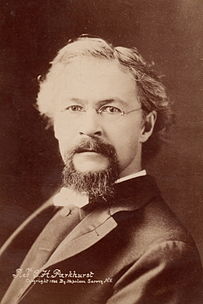Charles Henry Parkhurst
| Charles Henry Parkhurst | |
|---|---|

Parkhurst in 1892
|
|
| Born |
April 17, 1842 Framingham, Massachusetts |
| Died | September 8, 1933 (aged 91) Ventnor City, New Jersey |
| Occupation | Social reformer |
| Spouse(s) |
Ellen Bodman (m. 1870) Eleanor Marx (m. 1927) |
| Parent(s) | Charles Parkhurst |
Charles Henry Parkhurst (April 17, 1842 – September 8, 1933) was an American clergyman and social reformer, born in Framingham, Massachusetts. Although scholarly and reserved, he preached two sermons in 1892 in which he attacked the political corruption of New York City government. Backed by the evidence he collected, his statements led to both the exposure of Tammany Hall and to subsequent social and political reforms.
He was born on a farm on April 17, 1842 in Framingham, Massachusetts. Parkhurst did not attend a formal school until he was twelve. Despite this, he showed a strong interest in education and graduated from Amherst in 1866. He became principal of the high school in Amherst in 1867. He married Ellen Bodman on November 23, 1870, she being one of his former students. Parkhurst studied theology at Halle in 1869, and became a professor at the Williston Seminary in Easthampton, Massachusetts, in 1870–1871.
After further studies in Leipzig in 1872–1873, he was ordained as a Presbyterian minister. He was pastor of a congregational church at Lenox, Massachusetts, from 1874 until 1880, when he was called to the Madison Square Presbyterian Church, New York City, where he served from 1880 to 1918.
Interested in municipal affairs, Parkhurst was elected president of the New York Society for the Prevention of Crime in 1891, and he challenged the methods of the city police department. He inaugurated a campaign against the political and social corruption of Tammany Hall. The hall had begun innocently as a social club, but had drifted into politics and graft. It acquired a lock on elections in the city, and its bosses protected crime and vice in Manhattan and surrounding boroughs. Grand jury investigations were ineffective, despite the appeals of social reformers. Few in Parkhurst's congregation recognized that Tammany Hall, the police, and organized crime were interconnected.
...
Wikipedia
